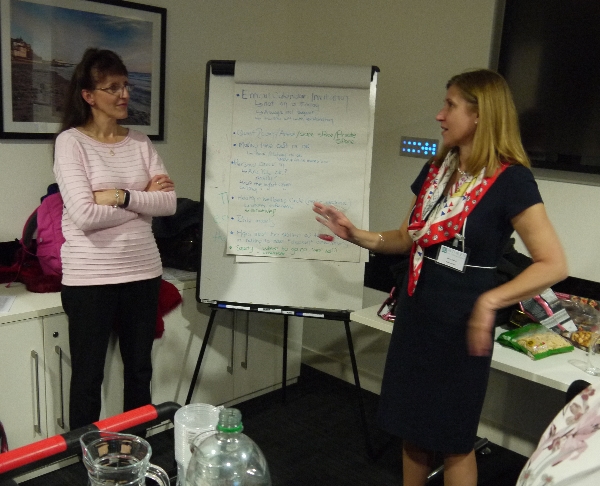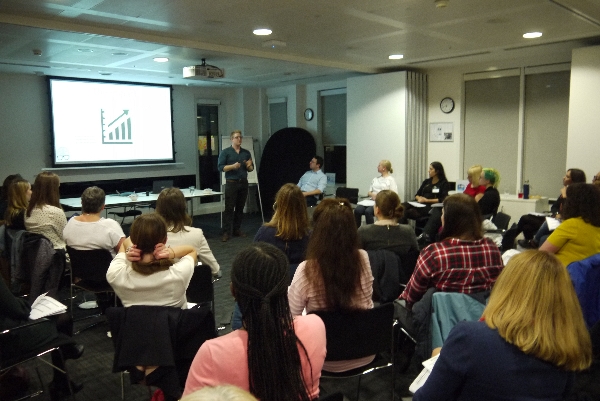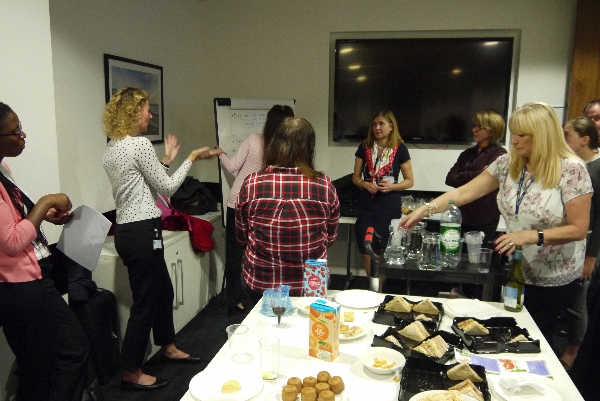By Mailys Pineau
Recently Women in Transport members gathered in the Rail Delivery Group’s offices in London Wall for an evening seminar and workshop on ‘Managing Stress & Anxiety,’ led by John Manning .
Jon Manning is the Managing Director of Arthur Ellis Mental Health Support, a not-for-profit organisation he founded, following his diagnosis of bipolar disorder, to train management, employees, parents, children and teachers how to identify and tackle mental health issues.
Jon started the session by telling us there is a current paradox in mental health: while the general awareness of mental health related issues has increased hugely in recent years, the funding for support services has been reduced by £105 million. This translates into a lot of people being able to recognise symptoms of mental health related issues, but insufficient capacity for them to be treated adequately.
Jon reckons it can take up to 8 months, at present, to get an initial NHS appointment related to a mental health issue. He went on to say that the impact of mental health issues represents £42 millions on the UK economy, a cost of over £1,300 per employee. To address this, Jon has worked with clinicians to come up with tools that managers can use to detect mental health issues and support employees.
To help us understand some of the feelings caused by anxiety, Jon involved us in several very interactive exercises. At one point he talked us through a scenario which helped us recognise how paranoia might feel. Then he had us jogging on the spot to get us experiencing one of the most common symptoms of anxiety – a racing heart. This was a very effective way of demonstrating how difficult it can be to continue to work effectively with anxiety symptoms.
In the second part of the session, members were invited to contribute to identifying behavioural and physical changes that can indicate someone is suffering from anxiety, which was defined as ‘a feeling of worry, unease about an uncertain outcome’. Jon explained that anxiety might come from a wide range of situations, including relationships, financial difficulties, work pressure, physical illness and drug/alcohol or medication misuse; sometimes with these situations overlapping. Then, in small groups, we discussed preventative actions to suit different businesses and came up with the following :
Promoting champions: Mental health first aiders and specifically trained role models.
Working environment: private dedicated meeting rooms, breakout spaces, sleeping pods, different work area options and family-friendly attitudes.
Day to day working: understanding of individual circumstances, more face to face interactions/personal check ins, working only within set hours, working flexibly.
Signposting: a single optimised source of information, understanding mental health conditions and mechanisms and helpline.
Activities: sport memberships, social/team activities, mindfulness, outdoor/active meetings, well-being days
Leadership & training: management training for mental health conversations, feedback system for effectiveness of leaders
The workshop was followed by networking over drinks and refreshments provided courtesy of the Rail Delivery Group.
Here are some comments from our members about the evening:
'I took away good advice on a clear work/life balance, switching off a lunchtime and being firm about my limits when planning work activities.’
'While it was mostly focused on looking at mental health from a management point of view, as a non-manager I found it very useful and will use it as I move forward within my company.'
'I enjoyed the smaller group and being able to talk to more people, The activities during the talk were good.'
'I liked the way Jon included physical objectives to represent life - juggling lots of different balls. It added an element of fun to the session and made what is quite a serious topic a bit more light-hearted.'
'It was helpful that we did the 30 seconds of exercise to show what someone might physically feel during an anxiety or panic attack.'
'The follow up information based on our group discussions was very useful.'
Our thanks to The Rail Delivery Group for their generous hospitality
Details of 2019 events will be published soon. In the meantime, please follow us @transportwm and on Linkedin to stay up to date with the latest news.




